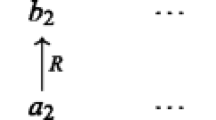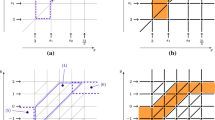Abstract
This work is about studying reasons for (un)decidability of variants of Monadic Second-order (mso) logic over infinite structures. Thus, it focuses on connecting the fact that a given theory is (un)decidable with certain measures of complexity of that theory.
The first of the measures is the topological complexity. In that case, it turns out that there are strong connections between high topological complexity of languages available in a given logic, and its undecidability. One of the milestone results in this context is the Shelah’s proof of undecidability of mso over reals.
The second complexity measure focuses on the axiomatic strength needed to actually prove decidability of the given theory. The idea is to apply techniques of reverse mathematics to the classical decidability results from automata theory. Recently, both crucial theorems of the area (the results of Büchi and Rabin) have been characterised in these terms. In both cases the proof gives strong relations between decidability of the mso theory with concepts of classical mathematics: determinacy, Ramsey theorems, weak Konig’s lemma, etc.
The author was supported by the Polish National Science Centre grant no. UMO-2016/21/D/ST6/00491.
Access this chapter
Tax calculation will be finalised at checkout
Purchases are for personal use only
Similar content being viewed by others
Notes
- 1.
A posteriori, the considered set Q needs to violate Baire Property.
References
Blumensath, A., Colcombet, T., Parys, P.: On a fragment of AMSO and tiling systems. In: STACS, pp. 19:1–19:14 (2016)
Bojańczyk, M.: A bounding quantifier. In: Marcinkowski, J., Tarlecki, A. (eds.) CSL 2004. LNCS, vol. 3210, pp. 41–55. Springer, Heidelberg (2004). doi:10.1007/978-3-540-30124-0_7
Bojańczyk, M.: Weak MSO with the unbounding quantifier. Theor. Comput. Syst. 48(3), 554–576 (2011)
Bojańczyk, M.: Weak MSO+U with path quantifiers over infinite trees. In: Esparza, J., Fraigniaud, P., Husfeldt, T., Koutsoupias, E. (eds.) ICALP 2014. LNCS, vol. 8573, pp. 38–49. Springer, Heidelberg (2014). doi:10.1007/978-3-662-43951-7_4
Bojańczyk, M., Colcombet, T.: Bounds in \(\omega \)-regularity. In: LICS, pp. 285–296 (2006)
Bojańczyk, M., Gogacz, T., Michalewski, H., Skrzypczak, M.: On the decidability of MSO+U on infinite trees. In: Esparza, J., Fraigniaud, P., Husfeldt, T., Koutsoupias, E. (eds.) ICALP 2014. LNCS, vol. 8573, pp. 50–61. Springer, Heidelberg (2014). doi:10.1007/978-3-662-43951-7_5
Bojańczyk, M., Parys, P., Toruńczyk, S.: The MSO+U theory of (n, \(<\)) is undecidable. In: STACS, pp. 1–8 (2016)
Bojańczyk, M., Toruńczyk, S.: Deterministic automata and extensions of weak MSO. In: FSTTCS, pp. 73–84 (2009)
Büchi, J.R.: On a decision method in restricted second-order arithmetic. In: Lane, S.M., Siefkes, D. (eds.) The Collected Works of J. Richard Büchi, pp. 1–11. Springer, New York (1962)
Carayol, A., Löding, C., Niwiński, D., Walukiewicz, I.: Choice functions and well-orderings over the infinite binary tree. Cent. Europ. J. of Math. 8, 662–682 (2010)
Carton, O., Colcombet, T., Puppis, G.: Regular languages of words over countable linear orderings. In: Aceto, L., Henzinger, M., Sgall, J. (eds.) ICALP 2011. LNCS, vol. 6756, pp. 125–136. Springer, Heidelberg (2011). doi:10.1007/978-3-642-22012-8_9
Friedman, H.: Some systems of second order arithmetic and their use. pp. 235–242 (1975)
Gödel, K.: The Consistency of the Axiom of Choice and of the Generalized Continuum Hypothesis with the Axioms of Set Theory. Princeton University Press, New Jersy (1940)
Gogacz, T., Michalewski, H., Mio, M., Skrzypczak, M.: Measure properties of game tree languages. In: Csuhaj-Varjú, E., Dietzfelbinger, M., Ésik, Z. (eds.) MFCS 2014. LNCS, vol. 8634, pp. 303–314. Springer, Heidelberg (2014). doi:10.1007/978-3-662-44522-8_26
Gurevich, Y., Shelah, S.: Monadic theory of order and topology in ZFC. Annal. Math. Logic 23(2–3), 179–198 (1982)
Hummel, S., Skrzypczak, M.: The topological complexity of MSO+U and related automata models. Fundam. Inf. 119(1), 87–111 (2012)
Jech, T.: Set Theory. Springer, Hiedelberg (2002)
Kechris, A.: Classical descriptive set theory. Springer, New York (1995)
Kolmogorov, A.N.: Operations sur des ensembles. Mat. Sb. 35, 415–422 (1928). (in Russian, summary in French)
Kołodziejczyk, L.A., Michalewski, H.: How unprovable is Rabin’s decidability theorem? In: LICS, pp. 788–797 (2016)
Kołodziejczyk, L.A., Michalewski, H., Pradic, P., Skrzypczak, M.: The logical strength of Büchi’s decidability theorem. In: CSL, pp. 36:1–36:16 (2016)
Liu, J.: \({\sf RT}^{2}_{2}\) does not imply \({\sf WKL}_{0}\). J. Symbol. Logic 77(2), 609–620 (2012)
McNaughton, R.: Testing and generating infinite sequences by a finite automaton. Inf. Control 9(5), 521–530 (1966)
Rabin, M.O.: Decidability of second-order theories and automata on infinite trees. Trans. Am. Math. Soc. 141, 1–35 (1969)
Rabinovich, A.: On decidability of monadic logic of order over the naturals extended by monadic predicates. Inf. Comput. 205(6), 870–889 (2007)
Shelah, S.: The monadic theory of order. Annal. Math. 102(3), 379–419 (1975)
Simpson, S.G.: Subsystems of Second Order Arithmetic. Perspectives in Logic, 2nd edn. Cambridge University Press, Association for Symbolic Logic, Cambridge, Poughkeepsie (2009)
Thomas, W., Lescow, H.: Logical specifications of infinite computations. In: Bakker, J.W., Roever, W.-P., Rozenberg, G. (eds.) REX 1993. LNCS, vol. 803, pp. 583–621. Springer, Heidelberg (1994). doi:10.1007/3-540-58043-3_29
Author information
Authors and Affiliations
Corresponding author
Editor information
Editors and Affiliations
Rights and permissions
Copyright information
© 2017 Springer International Publishing AG
About this paper
Cite this paper
Skrzypczak, M. (2017). Connecting Decidability and Complexity for MSO Logic. In: Charlier, É., Leroy, J., Rigo, M. (eds) Developments in Language Theory. DLT 2017. Lecture Notes in Computer Science(), vol 10396. Springer, Cham. https://doi.org/10.1007/978-3-319-62809-7_4
Download citation
DOI: https://doi.org/10.1007/978-3-319-62809-7_4
Published:
Publisher Name: Springer, Cham
Print ISBN: 978-3-319-62808-0
Online ISBN: 978-3-319-62809-7
eBook Packages: Computer ScienceComputer Science (R0)




